How to Verify a Service Dog
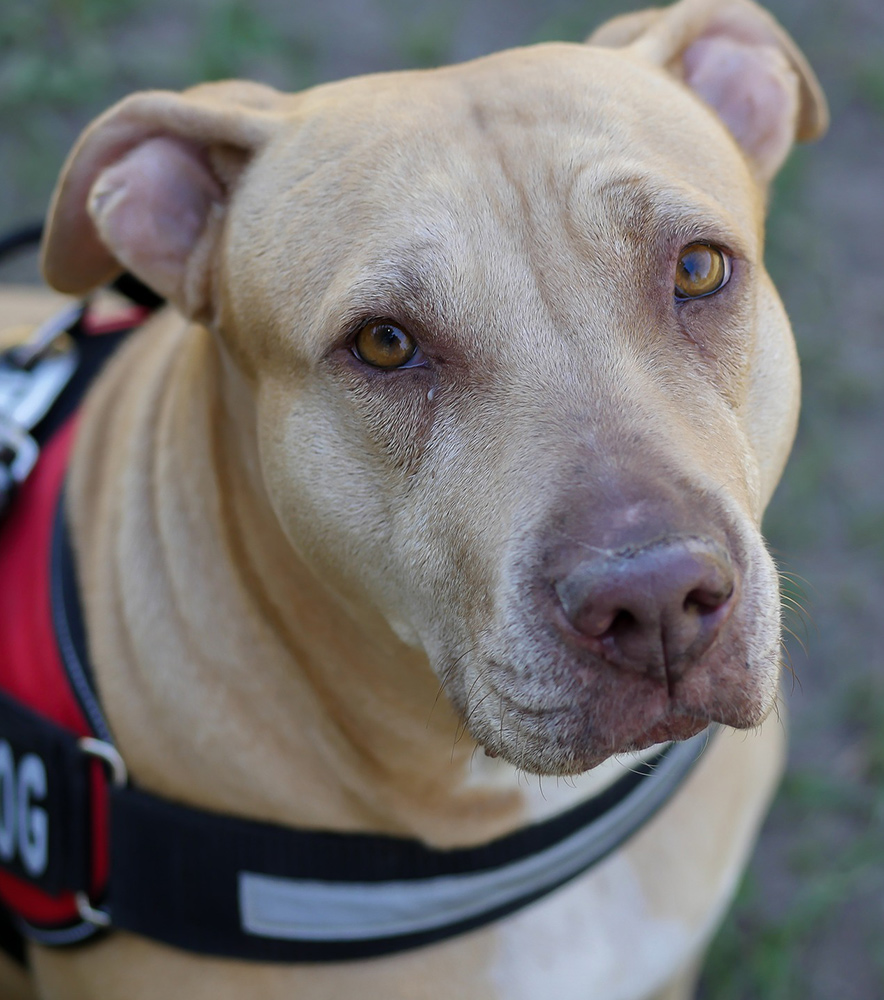
Trying to determine if a dog is a service dog can feel like a game of Twenty Questions, but there’s only really two questions a business owner is allowed to ask:
- Is the dog a service animal required because of a disability?
- What work or task has the dog been trained to perform?
As cryptic and frustrating as that sounds, these parameters are present for good reasons. They protect the personal privacy of the service dog’s handler. In addition, the Americans with Disabilities Act protects the rights and privacy of individuals with disabilities, thus also protecting the right of a service dog to perform their task. In short, owners of service dogs have federal rights. Because of these federal protections, the public should be aware of the appropriate way to verify a service dog.
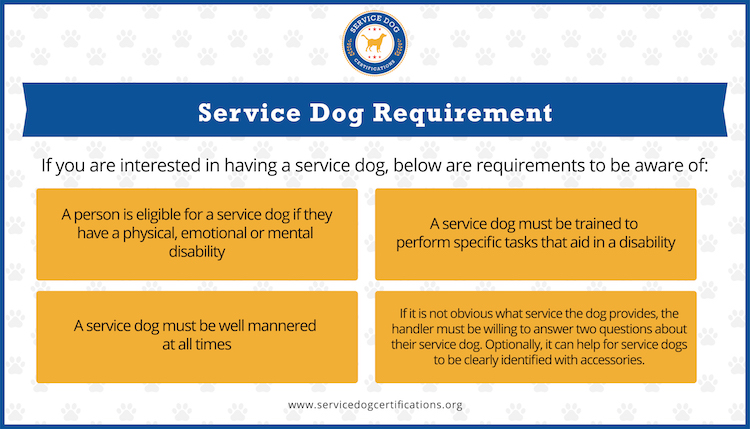
What is a Service Dog?
According to the Americans with Disabilities Act (ADA), a service dog is trained to complete a task directly relating to their owner’s disability. A service dog is not a pet but a way for a disabled person to overcome their disability. Because service dogs affect their owners’ health and welfare, they’re allowed into areas where pets aren’t typically welcome. Some examples of service dog tasks are:
- Alert people with hearing impairments.
- Identify impending seizures.
- Help people with mobility problems.
What Can You Ask a Service Dog Owner?
As stated prior, there are two questions a business can ask a service dog owner when trying to verify a service dog:
- Is the dog a service animal required because of a disability?
- What work or task has the dog been trained to perform?
Though other questions may seem relevant, they can be considered intrusive and discriminatory. Here are a few examples of questions that may seem pertinent but infringe on privacy or are discriminatory.
- What kind of disability do you have?
- Can your dog demonstrate what it does for you?
- Do you have documents to prove that your dog is a service dog?
- Why does that dog need to be with you in here?
- Would you be okay without the dog with you?
The ADA laws do not require service dogs to be registered, certified, or wear identifying gear such as a vest or ID tag. Therefore, asking for identification or documentation would not establish whether a dog is a service dog.
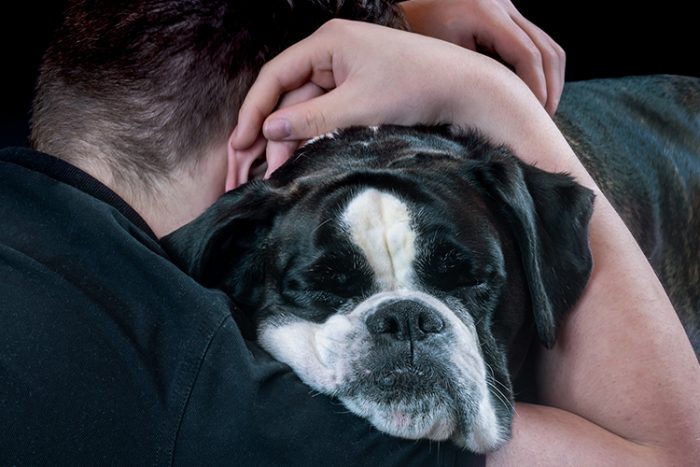
Where is a Service Dog Allowed?
Federal laws allow a service dog to go wherever their owner goes. This includes hotels, stores, movies, restaurants, airlines, and anywhere else typically accessible to the public. For example, service dogs can live with their owners in “no-pets allowed” housing due to the federal Fair Housing Act. Service dogs can also travel with their owners in the cabin of airplanes because of the Air Carrier Access Act. These federal laws also exempt service dog owners from any fees for housing, lodging, and travel typically applied to pets.
When Can You Ask a Service Dog to Leave?
Almost all service dogs are well-behaved and exceptionally trained, but they’re not always perfect. There are instances when service dogs may be removed from the area. The U.S. Code of Federal Regulations states that there are two reasons a service dog can be asked to leave the premises:
- If the service dog’s owner is not able to command the dog, and the dog is out of control.
- If the service dog isn’t properly housebroken or if the dog urinates or defecates in an inappropriate area.
If a service dog does not behave appropriately in public and is required to leave the area for any of the above reasons, the dog’s owner must be allowed to remain without the dog. If the service dog damages property, the business may charge the service dog owner for cleaning after the fact. Surcharges that usually apply to pets don’t apply to a service dog. Additionally, businesses can’t segregate service dogs and their owners from the rest of their patrons.
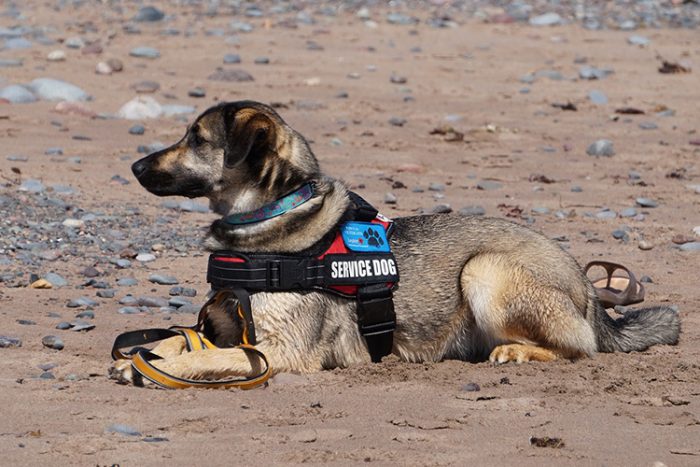
Misrepresentation of Service Dogs
Although there is no federal law that penalizes fraudulent service dog owners, many states have laws against the misrepresentation of a service dog. Nevertheless, people still attempt to pass their pets as service dogs. Service dogs undergo hundreds of hours of training.
Well-trained service dogs are usually not disruptive, unruly, or aggressive. When interacting with the public, service dogs remain focused on their work. They receive training to avoid interactions with others unless necessary because distractions can be dangerous for their owners.
Service dogs do noble and vital work for people who have disabilities. It’s essential to verify service dogs correctly, to adhere to federal laws, and to respect the work that they do.
About the Author: The writing team at Service Dog Certifications is made up of folks who really know their stuff when it comes to disability laws and assistance animals. Many of our writers and editors have service dogs themselves and share insights from their own experiences. All of us have a passion for disability rights and animals.
16 comments
Leave a Reply Cancel reply
Latest Posts

How to Bring a Service Dog to Six Flags Magic Mountain
Service dogs are welcome at Six Flags Magic Mountain so long as they are, according to Six Flags, “trained to do work or perform tasks for people with disabilities.” Of course, your dog must be housebroken and remain on a leash or harness and under your control while at the park — and the park […]

Read More

When Stores Can Refuse Your Service Dog
According to the Americans with Disabilities Act (ADA), service dogs should be allowed into any store most of the time. A store owner can legally exclude a service dog if they are actively growling, snapping at, or frightening customers, or if the dog is obviously out of the control of its owner. Ordinary behaviors — […]

Read More

How Much Should I Exercise My Service Dog?
Like any dog, a service dog needs exercise. While their work to support you involves a certain amount of physical activity, there’s a good chance it’s not enough to keep your dog healthy. The amount and type of exercise needed will depend on your dog’s breed and age. Fortunately, there is a wide range of […]

Read More





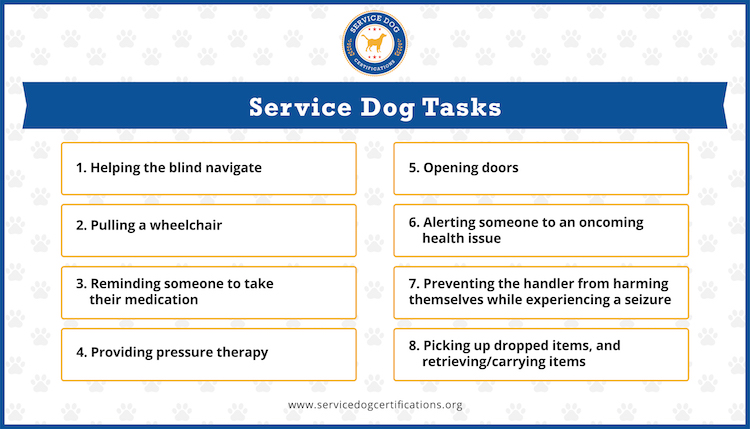

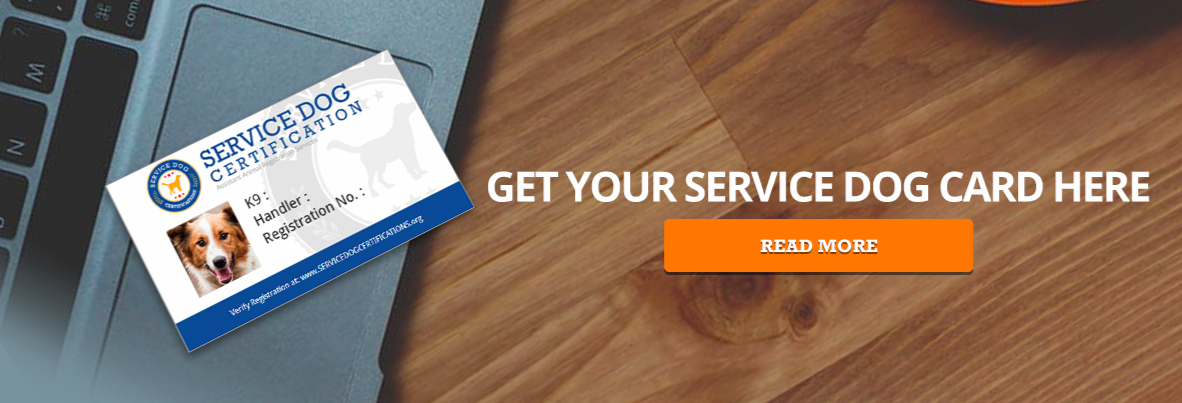

We have an issue on our community regarding a purported “service dog.” First and foremost, we have several restrictions regarding pets in our By-Laws – mainly on size, breed and restraining devices (leashes). We do not allow pit bulls, dogs over 40 pounds and all pets must be on a leash at all times while outdoors. We just had a renter come into the community with a 100+ pound dog, they never use a leash and the dog growls at other dogs in the community. Our Homeowners Association is supposed to get a letter from any prospective renter specifying they own a pet, what type of pet it is and the weight of the pet. They received none of this information and now the renter is claiming that the pet is a service dog. Is there any type of documentation that the HOA can request to verify this is, in fact, a service animal. There have already been more than 10 complaints regarding this dog (growling at other dogs, the owners not cleaning up the dog waste from it, it being walked without a leash and the sheer size of it). The renters that own the dog appear to be in their mid-twenties with 2 kids and the HOA wants to make sure they’re just not skirting the By-Laws by claiming service dog status. Any help you can provide would be great!
Under HUD rules, you can ask two questions: 1. Is the dog required because of a disability? and 2. What work or task has the dog been trained to perform? In addition, landlords can deny service dogs that pose a threat to the safety or health of other tenants. Please see this link for more information: https://www.servicedogcertifications.org/landlords-service-dog/
Does dog need to go through any exams before I can register the dog as service dog?
In addition to being fully trained to perform a job or task relating to the handler’s disability, a service dog should also be able to pass a public access test. A public access test demonstrates whether a service dog is capable of being well behaved and ready to perform its job in a variety of public settings.
do service dog owners have to prove that the dog is a service dog.
Third parties are allowed to verify service dogs by asking the two questions permitted under the ADA.
Under these criteria anyone can pass any dog off as a
service dog. The criteria only allows 2 questions but doesn’t require a specific answer, doesn’t require the animal demonstrate their work (you can’t even ask), and doesn’t require physical identification (can’t ask) as a service animal. If you ask the wrong question or make a misstatement as a you could face consequences. Also how would a retailer or any business owner verify the validity of the responses? So a retailer or other business has to allow every dog on their premises as it is too complicated and filled with risk to question dog owners in establishments. Plus they can simply lie and threaten legal action just because they want their pet in the store or restaurant with them.
In many states falsely representing a pet as a service dog is a crime. We share your concern about unethical individuals who attempt to pass of normal dogs are service dogs. However, as advocates for service dog owners, it’s also important that we do not let these few bad apples diminish the rights of legitimate service dog owners.
Is there a way to authenticate a service dog certificate? How can you tell if its a fake?
Service dogs are not required to have any type of certificate. Certificates are optional for service dog owners. To verify a service dog, you can ask two questions: 1. Is the service dog required because of a disability? and 2. What work or task has the service dog been trained to perform?
How many service animals can one tenant have? I have 1 tenant that has 3 dogs and from what I am hearing, she lets the dogs do their business in the unit. She does not take them outside.
There is no technical limit to the number of service dogs a person can have, but most people have one or two. Service dogs are also required to abide by basic sanitation and health rules. If a service dog is creating a health hazard or damaging property the landlord may take action against the tenant.
Based on the two allowable questions a business owner can ask about a service dog. How can a business owner determine if the answers given are acceptable? Or what if the patron refuses to answer the questions? What can be our course of action?
The patron must be able to the answer the questions if they want to be granted access with their service animal in a no-pets location. The only time the questions are not appropriate is if the disability related need for the service dog is obvious. Individuals are expected to act ethically and truthfully when answering the questions. Falsely representing that you own a service dog is punishable in many jurisdictions.
THANK YOU FOR ALL YOUR SERVICES.
My dog has flown on Alaska Airlines 3 times. She sits on my lap or lays on the floor. She is very helpful to me as I have severe hearing loss. I am 82 years old. She is a 17 pound Schnauzer and is 4 years old. Her name is Ziva Gross.